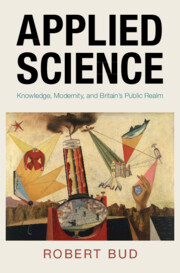4 results

Applied Science
- Knowledge, Modernity, and Britain's Public Realm
-
- Published online:
- 15 March 2024
- Print publication:
- 28 March 2024
6 - Progress in Applied Ecology
-
- Book:
- The Philosophy of Ecology
- Published online:
- 28 May 2021
- Print publication:
- 10 June 2021, pp 129-160
-
- Chapter
- Export citation
7 - Fact and Value in Applied Ecology
-
- Book:
- The Philosophy of Ecology
- Published online:
- 28 May 2021
- Print publication:
- 10 June 2021, pp 161-181
-
- Chapter
- Export citation
Stakeholder engagement and the perceptions of researchers: how agricultural modellers view challenges to communication
-
- Journal:
- Advances in Animal Biosciences / Volume 7 / Issue 3 / November 2016
- Published online by Cambridge University Press:
- 28 October 2016, pp. 240-241
- Print publication:
- November 2016
-
- Article
- Export citation

